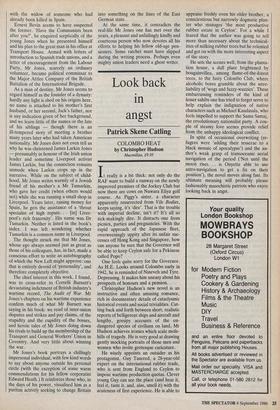Look back in angst
Patrick Skene Catling COLOMBO HEAT by Christopher Hudson Macmillan, £9.95 It really is a bit thick: not only do the RAF want to build a runway on the newly improved premises of the Jockey Club but now there are cows on Nuwara Eliya golf course. As Piggy's sister, a character apparently resurrected from Vile Bodies, keeps saying, it's 'dire'. That is the trouble with imperial decline, isn't it? It's all so sick-makingly dire. It distracts one from picnics, parties and pregnancies. With the rapid approach of the Japanese fleet, overweeningly uppity after its unfair suc- cesses off Hong Kong and Singapore, how can anyone be sure that the Governor will be able to keep Ceylon safe for a Pekinese called Popo?
One feels quite sorry for the Governor. As H.E. Looks around Colombo early in 1942, he is reminded of Nineveh and Tyre. Depressing. It makes him uneasy about his prospects of honours and a pension.
Christopher Hudson's new novel is an instructive and often amusing romance, rich in documentary details of cataclysmic historical events and social trivialities. Cut- ting back and forth between short, realistic reports of belligerent ships and aircraft and lengthy, gossipy accounts of the en- dangered species of civilians on land, Mr Hudson achieves ironies which scale mole- hills of tragedy. He is very good at drawing gently mocking portraits of those men and women who invite grotesque caricature.
He wisely appoints an outsider as his protagonist, Guy Tancred, a 28-year-old expert on the international rubber trade, who is sent from England to Ceylon to impose wartime production quotas. Clever young Guy can see the place (and hear it, feel it, taste it, and, alas, smell it) with the acuteness of first experience. He is able to appraise freshly even his elder brother, a conscientious but narrowly dogmatic plan- ter who manages 'the most productive rubber estate in Ceylon'. For a while I feared that the author was going to tell more than necessary about the technical- ities of milking rubber trees but he relented and got on with the more interesting aspect of the story.
He sets the scenes well, from the planta- tion house, a dull place brightened by bougainvillea, among flame-of-the-forest trees, to the fusty Colombo Club, where alcoholic bores grumble about the unre- liability of 'wogs and fuzzy-wuzzies'. These embarrassing reminders of the kind of lesser sahibs one has tried to forget serve to help explain the indignation of native characters such as Michael Kandasala, who feels impelled to support the Sama Samaj, the revolutionary nationalist party. A cou- ple of steamy love scenes provide relief from the unhappy ideological conflict.
In spite of occasional overwriting (re- fugees were 'adding their tesserae to a black mosaic of apocalypse') and the au- thor's weak grasp of transoceanic aerial navigation of the period (Not until the moon rises. . . is Onyette able to use astro-navigation to get a fix on their position'), the novel moves along fast. Its ultimate meaning will probably please fashionably masochistic patriots who enjoy looking back in angst.






































 Previous page
Previous page